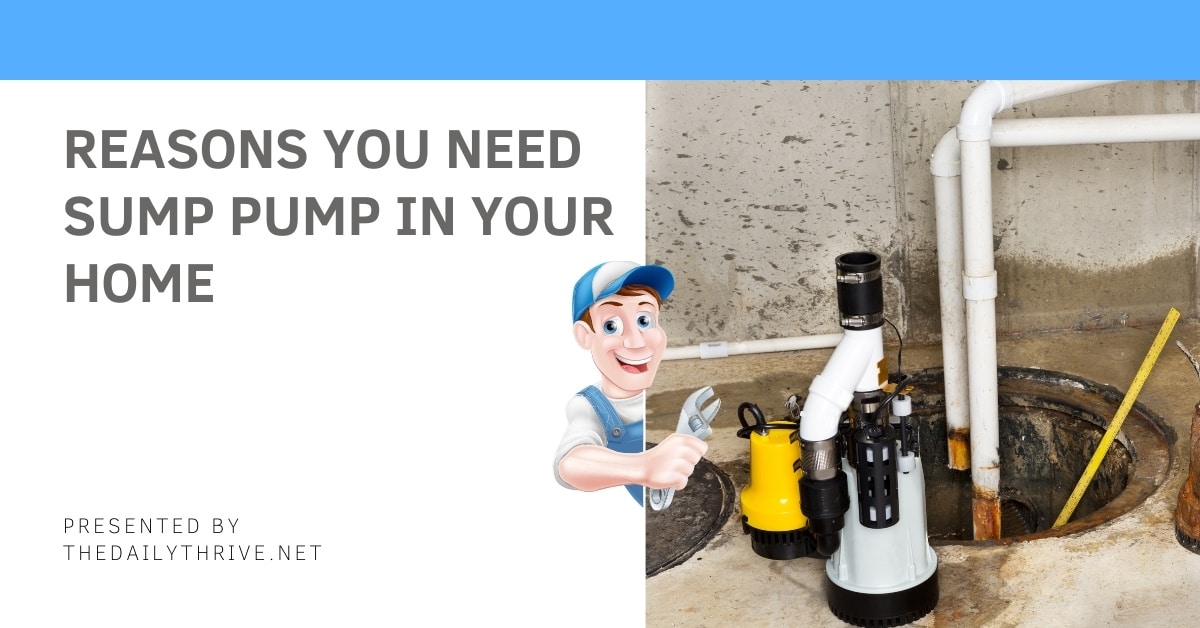Sump pumps are devices placed in a basement to pump out excess water that would otherwise flood the space. They’re almost always put in the lowest point on the floor and often in their specially dug pit. If you’ve ever gotten water inside your basement, you know you don’t want it to happen again. A sump pump is a good solution that will help keep your basement dry.
What is a Sump Pump?
A sump pump is a relatively small pump that a licensed plumber can install in your basement or crawl space. The pump is usually installed into a pit dug into the ground.
As the water starts to flow up from underground or down from the higher ground, it flows into the pit, either naturally or through drain tile, and the sump pump kicks in and pumps it out.
If installed properly, the pump should be able to keep up with water levels and pump enough water out so that the level never rises above the pit, which means it won’t flood into a basement or crawl space.
What are the Benefits of a Sump Pump?
Of course, the main benefit of a sump pump is keeping your basement dry. And by keeping your basement dry, you avoid water damage and the possibility of mold or mildew problems. A sump pump also can protect your foundation.
One of the main causes of cracked and bowing foundations is the pressure caused by water infiltration. Another less-obvious advantage to having a sump pump is that it may make your home more attractive when you want to sell it because the buyer will feel confident the basement will stay dry.
To Keep the Basement or Crawlspace Dry
This is the main reason why you need a sump pump in your basement. When the pump pit starts to fill up with water, the pump removes it through a pipe that leads to the outside.
The slope built around the house helps the water flow away from the building. A check valve between the pump and the pipe keeps the water from back flowing into the house.
Sump pumps either have a float activator like the one found in a toilet tank or a pressure sensor. Most sump pumps use electricity and don’t need special wiring.
To Prevent Mold and Mildew
Because the sump pump keeps the space under the house dry, it prevents mold and mildew. Mold and mildew are not just unsightly, but they can be health hazards to people who are allergic to them.
To Alert the Homeowner When the Water Level Is Too High
Even when a sump pump isn’t working, it can alert the homeowner if the basement or crawlspace is in danger of being flooded. Some sophisticated sump pumps can make a call to the homeowner’s cell phone if they’re away.
The homeowner can then call an emergency plumber to prevent a catastrophe in the basement.
A Working Sump Pump Adds Value to the Home
A sump pump in good working order makes the home more attractive to a potential buyer and might raise the property’s value overall. A basement that’s kept dry is more likely to be structurally sound than one that floods nearly every time it rains.
Sump Pumps Stabilize the Soil
Sump pumps used by commercial buildings also help stabilize the soil, which keeps the building itself stable. These pumps are often built in areas where there are aquifers.
Why Do You Need a Sump Pump in Your Home?
The main reason why you need a sump pump in your home is obvious: to keep your basement dry and avoid the expense of water damage. If there is a high water table where you live or the house has had water infiltration before, you need a sump pump.
You also need a sump pump and pit if you have a radon problem where you live. When the pit is dry, it can act as a good radon mitigation system and could save you from spending several hundred dollars on a radon mitigation system.
A sump pump is also a good idea for peace of mind, so you know you won’t have to worry about water problems.

